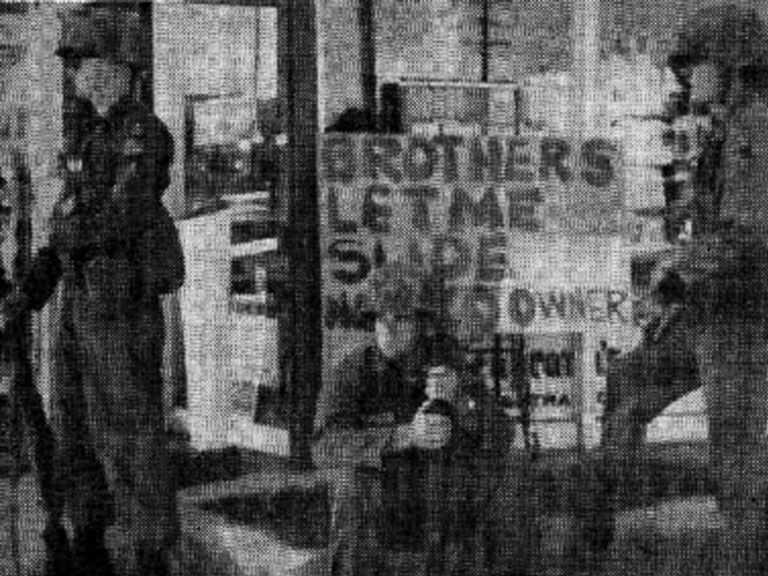In August 1965, tens of thousands of black people in the Los Angeles, California neighborhood of Watts rose up in rebellion against state and federal forces. To close out Black History Month, we're republishing a newspaper article exploring its reverberations through an interview with a champion of the uprising.
New York Herald Tribune, 29 September 1965
Bobbi Hollon, who grew up in Harlem, wears a pair of sneakers that are caked with blood. The blood spilled out of a wounded man's throat six weeks ago during the riots that bloodied the whole Watts section of Los Angeles, and soaked into Bobbi Hollon's speakers. "I'm never going to wash them," she says.
Bobbi Hollon is a young sociologist working for the Westminster Neighborhood Association in Watts, and she is prouder of her pair of bloody sneakers than of her degree from Morgan State College. Her pride is a key to the change in Watts since the riots.
The change in Watts is not physical. The scars of the uprising are still visible everywhere. Jagged edges of broken windows sit unfixed, dozens of plundered stores remain boarded shut, and, in an occasional ruin, the smell of fire lingers. And still the pastel-colored, one-storied homes look peaceful, their walls and palms and bright green grass hiding the squalor within.
The change is psychological. “There’s a new pride,” Bobbi Hollon said yesterday in the Westminster office on Beach Ave., just east of 103rd St., the heart of the riot area. “People here used to be ashamed to say they came from Watts. They used to mumble it. Now they say it with pride. This started during the riots. Boys who always wore their shirts open to the waist, who would have sliced you up in half-a-second, started falling in here every morning at 7:30 or 8 o’clock. They distributed food. They administered it. And they didn’t steal it for themselves. Sure, let’s not kid ourselves, they’d been looting. But then they’d found something important to do.”
Bobbi Hollon leans forward in her chair in the rundown building that houses the Westminster Association, and over her shoulder, through a window, you can see a sign saying, “Governor’s Commission” posted on a new glass-and-brick building. The commission is examining the riots, the causes and the aftermath, but no one in Watts expects the commission to accomplish anything.
Bring Dignity
“More than anything else,” said Miss Hollon, who serves as an administrator-trouble-shooter for Westminster, “what’s needed here is a real sense of human dignity, the feeling that ‘I am someone, I deserve respect.’ The riots helped create this feeling in some people. The riots are one of the best things that ever happened to Watts.”
She paused. “I’m not here for instigating violence,” she said, “but I’m not for turning the other cheek either. Maybe I should shine you on, tell you what you want to hear, but that whole Christian bit has been used against Negro people too long. These people here could loot for ten years and not get back half of the money they’ve been robbed of in these stored all these years.
“The people here tried legal means of getting help, and they got nothing. They begged the white people to listen to them, and nobody listened. Now the whole world is listening to Watts. I’m glad the riots happened. I’m glad to see anything happen that can help make this whole thing better. And people are making a serious mistake if they think the riots are over.”
Bobbi Hollon shook her head. “I’ll do anything I can to help here, with the kids, with their mothers, anything to give them some pride,” she said. “I’ll be fine and foxy if I have to be. Or I’ll be articulate. Or I’ll wear pants and bloody sneakers. I’ll be any one I have to be. But I won’t forget who I am.” She smiled. “I’m just a little black girl.” She said it fiercely proud.
